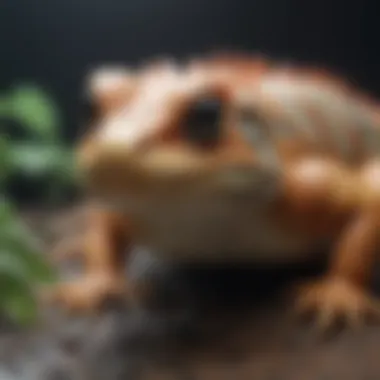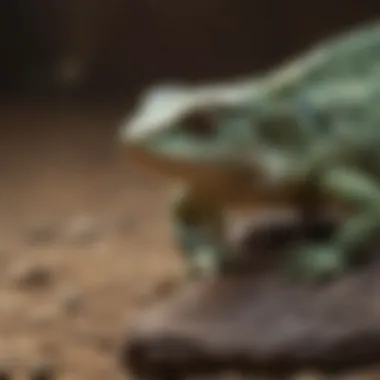Understanding Reptile Probiotics for Optimal Health


Intro
Probiotics might be a term more commonly associated with humans and pets like dogs and cats. However, their benefits extend significantly into the realm of reptiles as well. Probiotics are live microorganisms that contribute positively to the health of their host. This article aims to uncover how these organisms play a vital role in the digestive health, immune function, and overall well-being of reptiles.
Understanding reptile biology is crucial. Reptiles have unique digestive systems and metabolic pathways compared to mammals. This directly affects how they respond to probiotics. By focusing on probiotics, we can improve the quality of life for various reptile species. Not only do they aid in alleviating common ailments, but they also promote general health, making them a vital aspect of reptile care.
Understanding Your Pet
Pet Behavior Basics
Reptiles exhibit behaviors that are specific to their species. Understanding these behaviors can help in managing their health effectively. For instance, many reptiles will bask in the sun to regulate body temperature, while aquatic species may spend much of their time swimming. Recognizing what is normal for your pet can raise awareness of their health needs, including how probiotics can serve as a preventive measure for digestive issues.
Common Breed Characteristics
Different reptile species have distinct needs. For example, green iguanas may require higher levels of humidity, while corn snakes prefer drier conditions. Keeping these characteristics in mind can allow reptile owners to select appropriate probiotics tailored for their specific needs. Different strains of probiotics may be necessary depending on the species and its digestive requirements.
Species-Specific Needs
Each reptile has its unique dietary and habitat requirements. For instance, herbivorous reptiles like tortoises may struggle with fiber digestion. In contrast, carnivorous species like bearded dragons need assistance with protein breakdown. Probiotics can help enhance the gut flora, thus aiding in the digestion of these food types. Identifying the specific needs of your pet species is paramount when choosing the right probiotic supplement.
Pet Care and Maintenance
Feeding Guidelines
A balanced diet is crucial in keeping reptiles healthy. Owners should provide varied food sources, considering their pet's specific needs. Incorporating probiotics into their diet can help in nutrient absorption, leading to better health.
- Always consult with a veterinarian for specific dietary needs.
- Consider natural foods enriched with probiotics.
- Monitor the pet’s response to dietary changes.
Grooming Essentials
Grooming for reptiles can differ greatly from traditional pets. Regularly clean their living environment and remove any waste. This practice forms a crucial part of their overall health regimen. Probiotics can help combat harmful bacteria in their habitat as well, promoting a healthier space.
Hygiene Practices
Maintaining hygiene in your reptile's living space is essential. Regularly disinfecting tanks and using suitable substrates can reduce the risk of infections. Probiotics can enhance microbial balance, ensuring a safer environment for your pet.
Health and Wellness
Routine Vet Check-ups
Regular veterinary visits are vital. These check-ups provide a chance for health assessments. If you administer probiotics, inform your veterinarian, as they can influence digestive health metrics.
Vaccination Needs
While reptiles do not typically require vaccinations like mammals, preventative care remains essential. Probiotics can support a robust immune system, perhaps reducing the likelihood of infections.
Recognizing Signs of Illness
Being attentive to changes in behavior or physical condition can be crucial. Symptoms such as lethargy, appetite changes, or abnormal shedding may indicate health issues. In these instances, probiotics can often help address gut health problems that might be contributing to these symptoms.
Enrichment and Activities
Indoor vs.
Outdoor Activities
Reptiles benefit from both environments. Indoor setups allow controlled conditions, while outdoor exposure offers varied stimuli. Probiotics may play a role in stress reduction, which is advantageous regardless of the environment.
Interactive Toys and Games


Engagement is vital. Providing toys and enrichment activities helps stimulate your pet's mind. This approach complements dietary practices, including the use of probiotics, promoting a well-rounded lifestyle.
Socialization Opportunities
Although reptiles are not social like dogs or cats, they still benefit from routine handling and interaction. Familiarity can reduce stress, potentially leading to improved digestion. Alongside proper use of probiotics, this can enhance overall well-being.
Probiotics can significantly influence your reptile's digestive health, immunity, and overall life quality.
In summary, understanding and addressing the specific needs of reptiles serves to optimize their health. By incorporating probiotics into their care regimen, owners can help tackle common health issues, ensuring a happier, healthier pet.
Intro to Reptile Probiotics
Probiotics play a crucial role in the health and well-being of reptiles. Understanding their importance opens a pathway to better care practices for reptile owners. This section delves into what probiotics are and how they uniquely affect the digestive health of these animals. Reptile probiotics must be examined not only for their general benefits but also for specific roles shaped by the reptiles' anatomy and physiology. Fostering a solid grasp of these aspects lays the groundwork for effective use in promoting optimal health.
Defining Probiotics
Probiotics are live microorganisms that offer health benefits when consumed in adequate amounts. Commonly associated with gut health, these beneficial bacteria can positively influence a reptile’s flora. Unlike in mammals, reptiles have a significantly different intestinal structure. Thus, the function of probiotics in reptiles goes beyond merely balancing gut bacteria. They might improve digestion, assist immune responses, and potentially enhance overall energy levels. A more nuanced understanding of these microorganisms allows reptile owners to make informed decisions about supplementation.
The Unique Digestive System of Reptiles
Reptiles possess a unique digestive system that is adapted to their specific dietary needs. Unlike mammals, they often have a slower digestive process, which impacts how they process food and absorb nutrients. Their gastrointestinal tract's complexity varies widely across species, influenced by diet types such as carnivorous, herbivorous, or omnivorous patterns.
For example, some herbivorous reptiles require longer fermentation times to break down tough plant materials. This process can benefit from the support of probiotics, aiding in fiber digestion and nutrient absorption. Understanding this variation is essential in selecting appropriate probiotic strains for specific reptile species.
A properly functioning digestive system is crucial for the overall health of reptiles, impacting everything from nutrient absorption to immune function.
Recognizing the distinct features of reptile digestion guides owners in making better choices for probiotic use, ultimately improving their pets' well-being.
The Importance of Gut Health in Reptiles
In the realm of reptile care, understanding gut health is paramount. The unique anatomy and physiology of reptiles necessitate a focused approach to their digestive well-being. Healthy gut flora is not just beneficial; it is essential for reptiles to thrive in captivity. A balanced gut microbiome supports various physiological functions, from digestion to immune responses, impacting the overall health and longevity of these fascinating creatures.
Role of Gut Flora
Gut flora, also referred to as gut microbiota, serves as a complex ecosystem within the digestive system. This microbial community plays a significant role in maintaining health. Beneficial bacteria help break down food, synthesize vitamins, and regulate harmful pathogens. In reptiles, a balanced gut flora ensures efficient digestion and absorption of nutrients.
The role of gut flora can be understood through several key elements:
- Digestion: Certain bacteria break down complex carbohydrates that reptiles cannot digest on their own. This process not only aids digestion but also improves nutrient availability.
- Immune Function: A healthy gut microbiome acts as the first line of defense. It protects against pathogens by competing for resources and producing substances that inhibit harmful bacteria.
- Metabolic Health: Gut bacteria influence metabolic processes, impacting growth and energy levels. The right balance of microbiota can promote efficient energy utilization and body condition.
These aspects collectively underscore the importance of maintaining proper gut flora in reptiles. Disruptions in this balance can lead to digestive disorders, infections, and a compromised immune system, highlighting the need for probiotics in their diet.
Impact on Digestion and Nutrient Absorption
The relationship between gut health and digestion in reptiles is direct and profound. An efficient digestive system is crucial for their survival and well-being. Probiotics significantly enhance this process, helping to break down food more effectively.
Several factors explain how gut health influences digestion and nutrient absorption:
- Enhanced Breakdown of Food: Beneficial probiotics break down food particles more efficiently. This is particularly important for reptiles, whose digestive enzymes may be limited.
- Increased Nutrient Availability: As food is broken down, essential nutrients become more bioavailable. This ensures that reptiles receive the necessary vitamins, minerals, and energy from their diet.
- Reduced Risk of Digestive Disorders: A well-balanced gut prevents conditions like ileus or gastrointestinal stasis, common in many reptile species. By ensuring a healthy microbial balance, the risk of these issues diminishes.
Ultimately, the health of the digestive system relies on the presence of beneficial microbes. Without a proper balance, reptiles can suffer from malnutrition and other health complications that jeopardize their vitality.
It is clear that understanding and maintaining gut health in reptiles is not merely a matter of convenience; it is a critical component of their overall care. Owners must prioritize the inclusion of effective probiotics to support their pet’s digestive health and general well-being.
Benefits of Probiotic Use in Reptiles
Probiotics are gaining attention in reptile care due to their potential to enhance health. Understanding their benefits can empower pet owners to make informed choices. Probiotics help maintain balance in the digestive system, which is crucial for nutrient absorption and overall wellness.
Enhancing Digestive Health


Digestive health is one of the primary areas where probiotics make a significant impact. Reptiles have distinct digestive systems, and an imbalance in gut flora can lead to health issues. Probiotic use can restore this balance, improving digestion. The introduction of beneficial bacteria helps in breaking down food and aids in the absorption of nutrients.
This is especially useful for reptiles that experience dietary changes or are recovering from illness. For example, snakes and lizards can benefit from probiotics as they may struggle with digesting certain types of food. When these beneficial microorganisms are present, they can process food more effectively, leading to better health outcomes. Research shows that many reptiles show significant improvement in their gut health after consistent probiotic use.
Boosting Immune Function
A well-functioning immune system is vital for reptiles to ward off infections and diseases. Probiotics contribute to the strengthening of the immune system by promoting the production of antibodies. These beneficial microorganisms influence the gut-associated lymphoid tissue (GALT), which plays a significant role in immunity.
Moreover, probiotics can act as a barrier against harmful pathogens. They consume space in the gut, making it harder for harmful bacteria to thrive. This is particularly important for reptiles, which are often susceptible to infections. Research has indicated that probiotic supplementation can lead to an enhanced immune response, providing reptiles with a better chance of overcoming health challenges.
Mitigating Stress Effects
Stress can derail the health of reptiles, leading to various complications. Environmental changes, dietary modifications, or handling can induce stress, negatively impacting digestion and overall well-being. Probiotics can play a crucial role in mitigating these effects.
When reptiles are stressed, their gut flora can be disrupted. Probiotics can help counter this by stabilizing the gut environment, aiding in stress management. Some studies suggest that reptiles receiving probiotics show less aggression and stress-related behaviors. Maintaining proper gut health through probiotics may also help in keeping reptiles calm, which is beneficial for both pets and their owners.
In summary: Probiotics offer a myriad of benefits for reptiles, enhancing digestive health, boosting immune function, and mitigating stress effects. Understanding these benefits is essential for any reptile owner dedicated to optimal pet care. Their use can lead to a healthier, more vibrant reptile, ultimately improving the quality of life.
Identifying Probiotic Needs by Species
Understanding the specific probiotic needs of different reptile species is crucial for their overall health. Each species has unique characteristics that affect their digestive system and gut flora. Recognizing these differences helps owners make informed choices about probiotics, ensuring they select products tailored to their pets' needs. This section aims to provide insight into the specific requirements of common reptile species and the influence of age on probiotic effectiveness.
Common Reptile Species and Their Specific Needs
Reptiles come in various species, each exhibiting unique dietary habits and digestive physiology. Here are a few common reptile species and their probiotic requirements:
- Leopard Gecko: This species thrives on a diet rich in insects. Probiotics that aid in breaking down proteins and supporting gut health are particularly beneficial for leopard geckos.
- Green Iguana: As herbivores, iguanas require probiotics to help ferment plant materials. Products containing Lactobacillus and Bifidobacterium strains can improve their gastrointestinal function.
- Ball Python: Carnivorous in nature, ball pythons benefit from probiotics that assist in digesting larger prey. These strains can enhance their ability to absorb nutrients.
- Bearded Dragon: Omnivorous by nature, these reptiles need a balance of probiotics. Strains that support both plant and animal digestion are essential for their health.
Identifying the specific needs of each species can guide owners in choosing the right probiotic products. This, in turn, promotes better health and wellness for their reptiles.
Age-Related Considerations
Age plays a significant role in the probiotic needs of reptiles. Juvenile reptiles often require different assistance compared to adults. Young reptiles, still developing their digestive systems, may benefit from probiotics that enhance gut flora diversity and promote proper growth.
In contrast, adult reptiles might need probiotics that focus on maintaining gut health and supporting immune function. Additionally, as reptiles age, they may encounter digestive issues. Probiotics can help mitigate these issues and ensure comfortable digestion.
Choosing the Right Probiotic Products
Choosing the right probiotic products is crucial for maintaining the health of reptiles. A wide variety of products exist, but not all are created equal. The effectiveness of probiotics relies heavily on their formulation, strain selection, and product integrity. Understanding the types available, methods for evaluating quality, and what labels convey can greatly influence your reptile’s health outcomes. A carefully chosen probiotic can enhance digestive health and boost immune function, leading to a longer, healthier life for your pet.
Types of Probiotics Available
Probiotics are classified into various types based on their formulation and purpose. Here are the most common:
- Live Cultures: These contain live bacteria, which offer direct health benefits. Common strains found include Lactobacillus and Bifidobacterium.
- Prebiotics: These are non-digestible food ingredients that promote the growth of beneficial bacteria in the gut. They serve as food for the probiotics.
- Synbiotics: These products contain both probiotics and prebiotics, allowing for a more synergistic effect.
Each type serves different needs. Live cultures are often used for immediate digestive support, prebiotics for maintaining a balanced gut flora, and synbiotics for a comprehensive approach. Knowing the type that best suits your reptile species is essential.
Evaluating Product Quality
Not all products are of the same quality. Evaluating probiotic products requires a careful examination of several factors:
- Shelf Stability: Probiotics should maintain their efficacy until the expiration date. Check if the product requires refrigeration, which can impact its stability.
- Strain Specificity: Different strains provide different benefits. Look for specific information regarding the strains included and their proven effects on reptiles.
- Live Cell Count: Ensure that the product specifies the count of viable cells at the time of expiry. Higher counts generally indicate a more effective product.
- Reputation of Manufacturer: Select brands with a good reputation in the pet care community. Consult reviews and veterinary recommendations when possible.
Understanding Label Information
Reading and understanding the product labels is essential for making informed choices. Labels should include:
- Ingredients List: A clear breakdown of all components should be present. Avoid products with harmful additives or unnecessary fillers.
- Guaranteed Analysis: This portion indicates the number of live microorganisms present and their viability over time.
- Expiration Date: Essential for ensuring the product is used while fresh and effective. Probiotics should not be used after their expiration date.
- Feeding Instructions: Dosage recommendations can vary between products and species, so follow these carefully for optimal results.


Understanding label information can prevent unsuitable choices that may harm your reptile's health.
By considering these factors thoroughly, reptile owners can select the right probiotic products, enhancing the wellness of their pets. This thoughtful approach supports optimal digestive health and overall well-being.
Methods of Administration
Understanding the methods of administering probiotics to reptiles is crucial for maximizing their health benefits. Selecting an appropriate method ensures that the probiotic effectively reaches the gut, where it can exert its positive influence. Improper administration can diminish the potential improvements in digestive health and immunity that probiotics are known to support. In this section, we will discuss direct feeding techniques, incorporation into diet regimens, and the potential side effects to monitor when using probiotics.
Direct Feeding Techniques
Direct feeding is one of the simplest and most effective ways to give probiotics to reptiles. This method involves providing the probiotics directly to the reptile without mixing them into their food. This allows for precise dosing and can be particularly useful for reptiles that might not consume all of their food or are picky eaters.
There are several methods for direct feeding:
- Powdered Probiotics: These can be sprinkled on food items just before feeding. This technique ensures that the reptile receives a full dose of probiotics with each meal.
- Liquid Probiotics: Some owners prefer to administer probiotics in liquid form using a dropper. This is practical for reptiles that might not respond well to food-topped probiotics.
- Gel Products: These can be fed on their own or mixed with food. They are often designed to be appealing to reptiles, making them an attractive option for feeding.
Incorporating into Diet Regimens
Integrating probiotics into regular diet regimens is another effective strategy for enhancing the digestive health of reptiles. This approach allows for a consistent provision of beneficial bacteria over time. When forming diet plans:
- Select Compatible Foods: Ensure that the type of probiotic used is compatible with the reptiles' diet. Some probiotics are specifically designed to thrive in certain diets, making their impact more significant.
- Routine Feeding Schedule: Maintain a consistent feeding schedule. This regularity helps establish a routine that includes probiotics as a daily part of their diet.
- Adjusting Quantities: It may be necessary to adjust the amount of probiotic based on the reptile’s age, species, and health status. Monitoring their reaction to the probiotics is essential for determining the correct amount.
Potential Side Effects to Monitor
When introducing probiotics into a reptile's diet, it’s prudent to stay vigilant for any potential side effects. While probiotics are generally safe for reptiles, individual reactions can vary. Some side effects to watch for include:
- Digestive Upset: Changes in stool consistency or frequency can indicate that the reptile is having difficulty adapting to the new probiotics.
- Appetite Changes: A noticeable decrease in appetite might be a response to the new dietary element.
- Behavioral Changes: If the reptile seems more lethargic or displays signs of discomfort, it might be worth consulting a veterinarian.
Monitoring your reptile when introducing any new supplement is vital to ensure their well-being and health.
Expert Opinions and Recommendations
The integration of probiotics in reptile care has gained attention in recent years. Their role in supporting digestive health and the immune system is vital. Expert opinions provide valuable insights into the application and efficacy of these supplements. Consulting with professionals can help reptile owners make informed decisions. Through understanding veterinary perspectives, owners can better grasp the specifics of probiotics tailored for reptiles, recognizing the distinctive needs of various species.
Veterinary Insights on Probiotics
Veterinarians often emphasize the complexity of reptile health management. Probiotics can play a significant role in maintaining gut health. According to veterinarians, the right balance of gut flora contributes to digestive efficiency. They have observed improvements in digestion, nutrient absorption, and overall vitality in reptiles that have received such support.
Veterinary professionals encourage regular assessments to determine the need for probiotics. This includes examining diet, environment, and stress factors. For instance, reptiles that experience significant stress during relocation may benefit from probiotic supplementation.
Moreover, some vets recommend specific products based on the reptile species and its unique requirements. It's essential to consult with a vet before starting any supplementation regimen, ensuring consideration of possible side effects and interactions with other medications.
Case Studies in Reptile Health
Numerous case studies have documented the positive effects of probiotics in reptiles. In one notable case, a collection of bearded dragons exhibited digestive issues due to dietary imbalances. After incorporating probiotic supplements into their diet, the reptiles showed remarkable improvements. Symptoms such as lethargy and poor appetite lessened significantly. This example demonstrates the practical benefits when probiotics are appropriately utilized.
Another case involved leopard geckos experiencing stress-induced health challenges. Following the introduction of probiotics, the owners noted a reduction in stress-related symptoms. The geckos became more active and exhibited improved feeding behavior.
Animal care experts suggest these findings reflect broader trends observed across a variety of species. The enthusiasm within the veterinary community implies that further research is warranted, focusing on optimal formulations and application strategies to harness probiotic benefits effectively.
End and Future Directions in Research
The exploration of reptile probiotics has underscored their significant influence on the overall health and well-being of reptiles. This article has provided a thorough overview of how probiotics can positively affect digestive health, bolster immune function, and mitigate the effects of stress. As reptile owners, understanding the role that probiotic supplementation plays is crucial for enhancing the quality of life for these unique animals.
While current research has unveiled much about probiotic benefits, there are still areas that require further investigation. In particular, a deeper understanding of how different species respond to specific strains of probiotics could yield valuable insights. Additionally, long-term studies tracking the effects of regular probiotic use in a diverse range of reptiles would be beneficial.
Moreover, the potential for developing tailored probiotic formulations based on the unique needs of individual species holds promise for advancing reptile care. Recognizing the nuances of age, health status, and environmental factors in probiotic effectiveness is a vital consideration for owners.
It is crucial for reptile enthusiasts to stay informed about advancements in research related to probiotics, as this knowledge will help in providing the best care for their pets.
Recap of Key Points
- Probiotics play a significant role in the digestive health and immune support of reptiles.
- Tailoring probiotics to specific species and life stages can maximize benefits.
- Ongoing research is necessary to uncover optimal strains and formulations for diverse reptile health needs.
Areas for Continued Study
- Examination of species-specific probiotic strains and their unique effects.
- Impact of probiotics in relation to different age groups and health statuses in reptiles.
- Longitudinal studies assessing the long-term benefits and potential risks associated with regular probiotic use.
- Development of customized probiotic products designed to meet distinct dietary and environmental needs of various reptile species.







